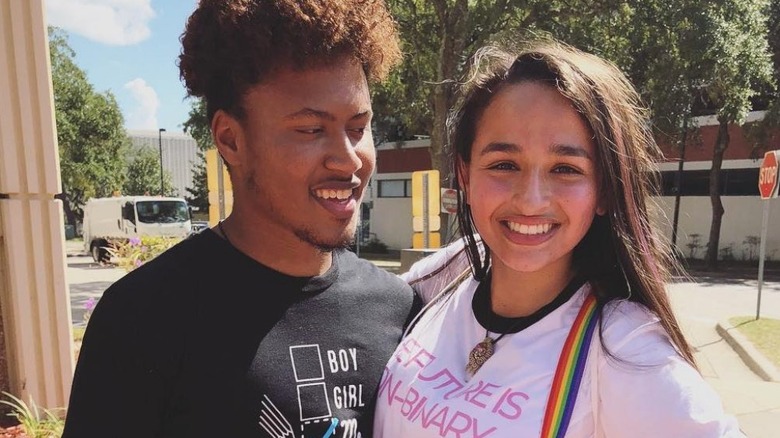Tragic Details About Jazz Jennings' Life After Fame
Jazz Jennings came out as transgender at 5 years old and, with her family's support, started to transition. In 2007, the then 6-year-old entered the public eye on national television when she told Barbara Walters something that she always knew: despite what her birth certificate says, she is a girl. Since then, Jennings has been on a mission to bring awareness to gender identity. From appearing on "The Oprah Winfrey Show" and co-writing a children's book to leading the New York Pride parade and starring in a TLC reality show about her life, her mission has taken her around the world. However, being an activist for LGBTQ+ and trans rights isn't easy; from everyday challenges to eating disorders, the star has been candid about hardships in her life.
She recently celebrated a major weight-loss milestone on Instagram after successfully losing 100 pounds — about the same she gained from an eating disorder. "Good health is not a certificate you display, it is a constant effort!" Jennings wrote in the caption. Unsurprisingly, Jennings' weight loss journey and transformation is turning heads. Over the years, Jennings fought for the LGBTQ+ community while she battled with mental health issues and severe burnout, which sometimes impacts her work. "I can't always take care of the world or put myself out there as much," she told The Crimson.
Her book, I Am Jazz, was banned multiple times
In 2014, the then 14-year-old Jazz Jennings co-wrote a 32-page children's book, "I Am Jazz," about transgender life and self-identity. In the book, she spoke about the challenges and frustrations she faced as a transgender kid. Though the book didn't include the medical and psychological treatment she underwent as part of her transition, it had enough controversial content to be banned around the U.S. In 2015, the book was No. 3 in the American Library Association's Top 10 Most Challenged Books and it continued to sit on the list through 2017. In 2019, "I Am Jazz" was again at the No. 6 spot of the most challenged books in America.
In an Instagram video published in 2022, she opened up about her disappointment with ongoing efforts to ban her book. "Today, despite living my life as a proud trans woman, my children's book 'I Am Jazz' is banned all over the country. Legislators ban the book out of fear that it will recruit or brainwash kids into being LGBTQ+. It does not," she said. Jennings further explained that "I Am Jazz" answers gender identity questions that trans kids have growing up. "The book is about identity and it helps so many transgender youth learn about their self-identity and who they are. It helps families better support their transgender child and friends better support their transgender friend."
Jazz Jennings has received frequent death threats
Being a public figure and activist means putting herself on the front line. While Jazz Jennings fights for trans rights and gender equality, she faces pushback and threats against her safety. In 2023, Jennings, 22, who was attending Harvard in Cambridge, Massachusetts received a death threat delivered to her doorstep. While speaking to People, the star opened up about the downside of being in the public eye and speaking up for what she believes in. "I get death threats almost on a daily basis," Jennings said. It has become a part of her life as she continues to push for change, speaking up about her truth. "People will comment on my photos saying, 'Burn in hell. Kill yourself. You're [an] abomination."
However, a death threat delivered to her address was an even bigger invasion of her comfort and safety. "When someone sends a threat to where you live, and they know your location, it's a really, really scary feeling knowing that someone is kind of stalking you a little bit and they have these ill intentions," she said. The threat wasn't just an expression of anger in the comment section. It had real intent to silence her with extreme measures. "It's sad that we live in a world where people want to kill each other just for being who they are." What's worse is that the threat likely won't be the last. "It just won't stop," Jennings said.
She feels pressured to speak out as a trans woman
Despite living in the spotlight, the untold truth about Jazz Jennings is she's a private person who naturally wants to avoid attention and just be who she is. However, she felt responsible as a trans woman to speak up about her experience and fight for others, knowing the conditions many transgender people live in and how she could make a difference in their lives even if it came at a cost to her health.
"Being in the spotlight can be very overwhelming, especially as I don't really love attention," she told Hello Giggles in 2017. Behind the scenes, she struggled with anxiety, but in front of the camera, she always put on a brave face for others. "I know that this isn't an individual fight. We are all fighting together for equality. If by being an advocate, I change one person's mind and/or save someone's life, it's worth it." Her cause became her life. "I would always put my own fears and anxieties aside to move the cause forward," she said.
Jennings felt responsible for utilizing her influence to create more space. "I do put that pressure on myself," she told E! News in 2023. However, anti-trans actions and constantly being in the public eye took a toll on her mental health. In 2019, she decided to take a 2-year break. "I needed that break for my mental health and wellness, honestly," she told Variety.
Jazz Jennings struggled with depression
In 2016, after sharing details about her transition and life with the public for a decade, the then-15-year-old Jazz Jennings published a book, titled "Being Jazz: My Life as a (Transgender) Teen," in which she opened up about other struggles and challenges she faced in life. Talking to Teen Vogue, Jennings revealed the toughest subject to write about in her book. "The hardest part to share was about my depression," she said. and it had nothing to do with her being transgender. "It's genetic. My mom has it." Depression and mental health issues are also struggles that many LGBTQ+ people face. "Why? A lot of it has to do with the hate and lack of acceptance we receive in society," she wrote on X, formerly Twitter.
She revealed to Teen Vogue that she was in a "dark state" for a while. "I had no thoughts of moving forward, only staying in the past and present, dwelling on all of my bad decisions and negative thoughts." She didn't want to talk to anyone, even her friends and family. "If they tried to help me, I would kind of back away from them." In retrospect, she acknowledged that her mother's love and support helped her find the way forward. But in the end, she had to rely on her own strength. "The biggest way of coming out of depression is inner resolve. I have to control myself. I have to tell myself, 'no, focus, focus, do this, do this, do this.'"
If you or someone you know needs help with mental health, please contact the Crisis Text Line by texting HOME to 741741, call the National Alliance on Mental Illness helpline at 1-800-950-NAMI (6264), or visit the National Institute of Mental Health website.
She experienced cyberbullying
Jazz Jennings talked about cyberbullying in Season 2 of "I Am Jazz," revealing the hate she faced on a regular basis both in person and on the internet. "On every single picture on my Instagram page, you'll find a negative comment," she explained to Teen Vogue. Her supporters would defend her in the comment section, but the conflict and hate in each post are not easy to digest. "It will become a big argument, and it's just a lot." She tried to stay away from all the hate and think positively, but it can be very draining with others trying to discredit her experience when she was being vulnerable.
Replying to her own post about using hormone blockers to not having to go through male puberty, she posted on X, "Yes, I do struggle with my mental health and always have. It was not because I transitioned, and it's, unfortunately, something many LGBTQ+ people face." "Cyberbullying is definitely real," Jennings said in the same interview with Teen Vogue. "I try to tell myself not to listen to the haters, and I try not to read the comments because it's not worth it. If someone is judging you without knowing the content of your character, don't listen to them. It's not okay, I'm not going to tolerate it."
Jazz Jennings deals with burnout on a regular basis
Fans may have wondered what Jazz Jennings' life would be like at Harvard, and unfortunately, she had a really rough time after being accepted. Not only did many people try to discredit her achievement, but years of living in the spotlight pushed her further to the edge. "I'm in a constant state of being burned out, not going to lie," she told Thrive Global in 2019 before starting school as a freshman at Harvard. "The past two weeks I've been feeling burned out to the greatest degree, and there were some moments when I didn't even think I was going to be able to take this trip to New York."
She wanted to experience life and have all the wonderful adventures possible at Harvard, but instead, she felt immobilized. "Burnout is this overwhelming feeling of being stuck. Feeling like you can't make changes to your life because you have so many things to do, and you feel so anxious about doing all of those things." She looked forward to being more independent as a college student, but the environment itself was a stressor. "I can feel that anxiety and depression to an even greater degree than I do now because there's so much going on all the time." Her phone also became one of her worst enemies which could easily put her in distress.
She struggled with binge-eating disorder
Starting college was supposed to be a time of growth and celebration, but Jazz Jennings' mental health declined rapidly, causing her to press pause on her mission. She deferred her admission to Harvard and disappeared into her private world. It was during that time that she started binge eating. After retreating from public attention for two years, she returned, baring a heartbreaking update on her health. "Two years ago, I was on my way to one of the greatest institutions in the world, but I was actually struggling severely with mental health issues," she shared in a teaser video for "I Am Jazz" Season 7. "I started binge eating, and I gained weight, and more weight, and more weight, and now, almost 100 pounds heavier, here I am today."
She shared a picture of herself in comparison to a photo before her weight gain on her Instagram. "I'm not only addicted to food, but I eat it in large quantities," she wrote in the caption. Her mental health struggles led to binge eating, which was amplified by the increase in appetite from her medicine. She was over 234 pounds during the making of the teaser video. "It's time for me to address my weight gain and hold myself accountable." She had tried and failed many times to get to that point. "I've been saying I'm ready to turn over a new leaf, but I'm running out of trees now."
Jazz Jennings' mental health suffered after weight gain
Binge-eating disorder isn't just eating a lot of food; those who suffer from the condition often aren't able to stop eating until they are forced to do so. Though treatable, the disorder can be potentially life-threatening. "You eat to the point that you're uncomfortable and you often feel depressed and disgusted with yourself afterward," licensed psychologist and eating disorder specialist, Dr. Ann Kearney-Cooke said, shedding light on the condition in an interview with Today. She clarified that an eating disorder isn't just about eating a lot. "The difference is that people who just eat a lot, they might just eat a lot at each meal, but they're not binging and feeling out of control for two hours or three hours."
Jazz Jennings opened up about her binge eating disorder in the same interview. "I was in this dark, dark place," she said. She found herself unable to connect to the person she used to be. "I can't do so many things with my body that I used to be able to do." She experienced many times trying to fight her way back. "She's addicted to food, and you can't kick that addiction until you're ready to," her mother Jeanette Jennings shared (via Today). It was undoubtedly rough for Jeanette watching her daughter go through that and trying to help her without being too harsh.
She was fat-shamed by her family
Addiction is hard on the whole family. When Jazz was struggling, her family also had a hard time supporting her. "We try to be supportive and yes, sometimes we're annoying," Jeanette explained in a trailer for Season 7 (via Today). It's a fine line between being constructive and dictating, and as parents, it's never easy to watch their kids struggle. "We're like, please don't order it and then she orders and we're like why did you do that?" During that time, Jazz also tended to oversleep, and it made Jeanette worry, especially with Jazz going to Harvard soon. "At least, Greg and I are around to prevent her from oversleeping. What's going to happen when we're not there?"
From how much is one tablespoon to telling her to chill about butter, her family tried their best to stop her from eating, but for Jazz, it made her feel judged and even worse about herself. "I do experience fat-shaming from my family. It made me very humiliated," she said in "I Am Jazz" season 7 teaser video. She was in a vulnerable place, and those who tried to help weren't unaware of her internal turmoil. "There's terrible shame people feel," Dr. Kearney-Cooke explained (via Today). "They feel disgusted with themselves. Depressed. So letting your family know is healthy. " And it's all about communicating. "It's really just being there helping them make better decisions and allowing them to guide you every step of the way," said Jazz.
Dating has been challenging for Jazz Jennings
After undergoing gender confirmation surgery at 17, Jazz Jennings met her first-ever boyfriend, Ahmir Steward. Their relationship started sweet when it was just the two of them, but things took a sudden turn when Steward told his mother about Jazz. "My mom is not actually as accepting as I originally thought she would be," Steward said on an episode of "I Am Jazz" (via YouTube). His mother misgendered Jazz and refused to acknowledge her as a woman. "The most hurtful thing that my mom said was that Jazz was still a man and that I would be gay for being in a relationship with Jazz," he said. Her disapproval put a strain on their relationship. Though Steward told Jennings that they should focus on what they had, the two eventually split.
After Steward, Jennings took a break from dating, and it wasn't until four years later that she went on another date. In February 2023, Jennings went on a double date with Dayron, her brother, and his "lady friend" for private dancing lessons, but she felt uncomfortable being put on the spot and started overthinking when Dayron didn't understand her nervousness. "I wish people understood that dating as a trans person is really hard because transgender people are immediately judged and ostracized for who they are," she told People. "I wish people could be like, 'You know what? I don't care that you're transgender. You're just a woman to me. You're beautiful. And I see that in you."
She was required to have a psychiatric team for Harvard readmission
After starting to get herself in shape both mentally and physically, Jazz Jennings started the readmission process to Harvard in late 2021 for the next chapter in life. However, the process didn't go as smoothly as she had hoped. A phone call with the university's representatives about her pending admission informed her that she needed to establish a team of mental health care providers in Boston to be able to attend school. "There were concerns," she said in an episode of "I Am Jazz," (via YouTube). "I need to establish a clinical team up there [in Boston], so I need to transition from my current doctors to a new set of therapists, psychiatrists, and case manager."
She only had a few weeks to make it happen, and the admission board would also have to assess her case to decide whether she was able to attend that year. "We worked hard as a family to get Jazz with the right medical team down here in Florida," her father, Greg, shared. Having to put a team together from scratch within weeks was a stressful process. Jeanette also defended her daughter, adding that it was never a requirement. "I would be devastated if I didn't get the opportunity to go to school because I didn't put a clinical team together in time," Jazz shared, feeling the request was unfair. "They can dictate the course of the rest of my life by what they decide."











